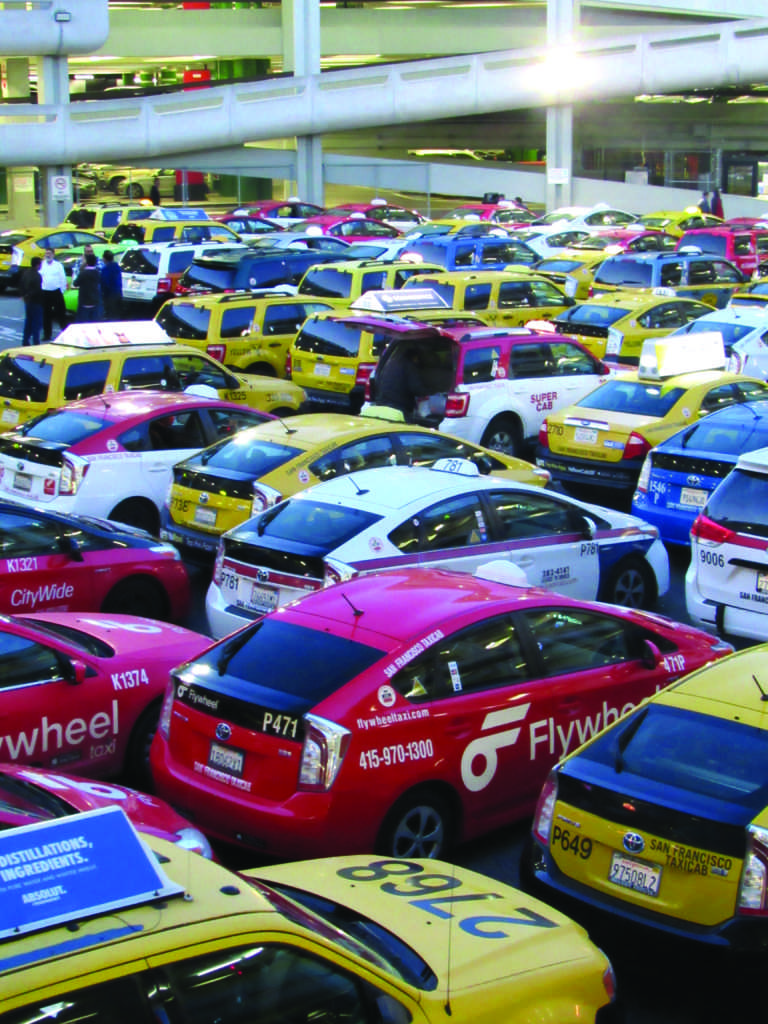The San Francisco Municipal Transportation Agency is facing controversy over a new airport regulation that blocks access to San Francisco International Airport for hundreds of drivers while prioritizing others.
The new policy, which went into effect Friday morning, is leading many taxi drivers into conflict not only with their biggest competitors like Uber and Lyft, but with each other.
The medallions, which are small license plate permits that allow taxi drivers to pick up passengers at the airport, will exist in a hierarchical system with the implementation of SFMTA’s new policy. The priority at SFO will be given to drivers who have what are known as purchased or “P” medallions, of which SFMTA has sold about 700 since 2010 at $250,000 apiece.
These drivers are facing fewer consequences than those who have “K” medallions, which are earned by seniority on a waiting list and can often take up to 15 years to obtain. Meanwhile, older licensees with “legacy” medallions are being restricted entirely from SFO.
SFO is required to implement any new policy approved and admitted by SFMTA.
“The airport has always had staging lots that are used to meter in taxi cabs to ensure that the MTA process for how taxi cabs can serve customers is being followed,” said SFO spokesperson Doug Yakel.
“We have essentially reconfigured staging lots to reflect this new arrangement,” Yakel said. “We have staff that coordinate the movement to ensure that each location at each terminal always has enough taxis based on customer demand.”
The policy will continue to grant access to purchased medallions taxis, earned medallions taxis and ramp taxis, which are taxis that meet wheelchair and disability requirements, according to Yakel.
Conflict arose after many “K” medallion taxi holders said the new policy is favoring “P” purchased medallions taxi holders and will create fewer passenger pick-ups for those that earned their medallion.
“They are only allowing the people who purchased the medallion for $250,000 to have access to pick[ing] up [passengers] first by dividing the drivers,” said Michael Peterman, a taxi driver with two decades of experience.
Peterman said many taxi drivers still owe a lot of money for their medallions, and with fewer customers and the new rules in place, they will never be able to pay them off.
“Initially when they financed the medallions through the bank, the SFMTA signed to the bank that if there [is] not enough business for the drivers to pay the medallion loan, they would buy back the medallion.
Now they are renegotiating from what they agreed with the bank,” Peterman said. “By creating this division, they are trying to use the people who have worked like slaves to pay the bank for the next 20-30 years. They are entrapping these people even worse than what they are right now.”
As of Friday morning, the new policy started the division of taxis. Taxis that did not meet policy requirements were turned away by SFO.
Muhammad Bathai, who has driven an earned medallion taxi for more than 31 years, explains how the policy accommodates purchased medallions.
“Three of the ‘P’ medallion taxi drivers will [be allowed to] go down [to] the lot [to pick up the passengers] and then one ‘K’ medallion taxi driver will go down,” Bathai said.
“It is three to one,” he said. “Which is not fair for any cab driver to sit here for many hours [just] because they did not purchase the medallion.”
Taxi drivers are required to have a medallion to pick up or drop off passengers at SFO while rideshare app services like Uber and Lyft are exempt.
Ismael Coronado, an Uber driver for the past two years, talked about how easy it is to pick up and drop off customers at the airport.
“Uber has their own section where you can drop off and pick up ride-shared apps,” Coronado said. “The only restriction is that I can’t take too long when I drop people off or when I am picking them up.”
Taxi drivers are also required to pay a much higher fee in insurance than services like Uber and Lyft, another disadvantage they have in comparison to rideshare apps. Peterman said he pays almost $900 a month while Coronado only pays $230 a month.
“If people could go back in time, they would have never bought these medallions,” taxi driver Muhammad Chadi said. “Nobody is considering my livelihood as a taxi driver.”
SFMTA spokesperson Paul Rose said SFMTA has been working on taxi reforms to improve the transportation system and maintain the value of purchased medallions. One of the key reforms is to ensure that drivers who have paid $250,000 for the medallions will have express access to SFO pick-ups.
“We believe this will improve business for these purchased medallion holders and help provide more taxis to the city,” Rose said.
SFMTA will be monitoring the policy and relying on feedback to make any adjustments.







